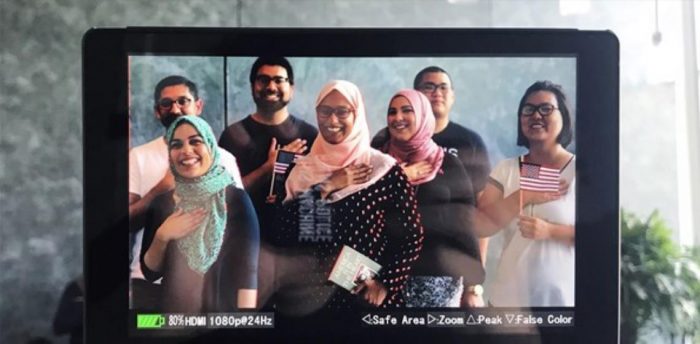America is in the Heart
The Smithsonian Asian Pacific American Center has introduced a new video, America is in the Heart, based on the 1946 novel by Filipino American writer Carlos Bulosan. This video honors Bulosan’s historic text during a critical time in America’s deep history of immigration and recognizes the 45 million immigrants who have become Americans since the book was first published.

Filmmaker Frank Chi filming a group of immigrants for Smithsonian APA Center’s “America is in the Heart”Courtesy of Frank Chi
APAC partnered with Hasan Minhaj (The Daily Show correspondent, star of Netflix’s Homecoming King), Ivy Quicho (community organizer) and Junot Díaz (Pulitzer-winner and author of The Brief and Wondrous Life of Oscar Wao and This is How You Lose Her). This film was created by Frank Chi, who was also behind last year’s Letters From Camp.
Filmmaker Frank Chi first encountered Carlos Bulosan’s 1946 book “America Is in the Heart” as a college student more than a decade ago.
An Asian-American immigrant who had difficulty finding a sense of belonging, Chi said the book — which loosely mirrors Bulosan’s immigration from the Philippines and describes the suffering of migrant laborers in the 1930s — resonated with him, helping him learn how to be an American in his own way.
In this new film, Chi is bringing Bulosan’s words to life.
“There’s a lot of negative portrayals of the families who come to this country from all parts of the world searching for a better life,” Chi said. “Given the times we live in, I wanted to revisit Bulosan this way because we can all use a reminder that there have been other tough times in America, and we have persevered and become stronger as a people, and as a nation.”
“‘Letters from Camp’ is a stark reminder from the past so we can collectively say ‘never again.’ ‘America is in the Heart’ is about what sustains us as a people — in the past, today and forever.”
“‘Letters from Camp’ is a stark reminder from the past so we can collectively say ‘never again.’ ‘America is in the Heart’ is about what sustains us as a people — in the past, today and forever.”
;
This post is an edited version of a story published by NBC News. Read more of Frances Kai-Hwa Wang’s interview with Frank Chi.
Posted: 12 December 2017
-
Categories:
Collaboration , Education, Access & Outreach , Feature Stories , History and Culture



